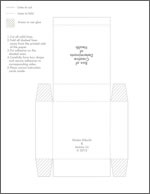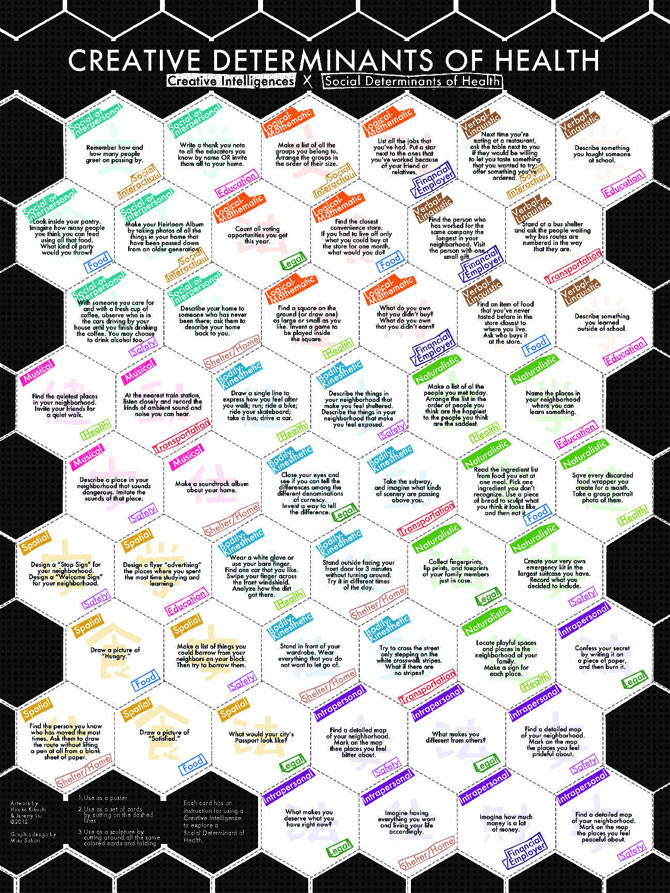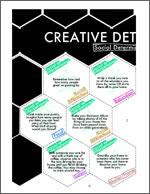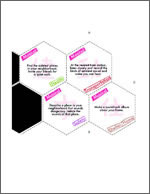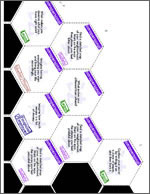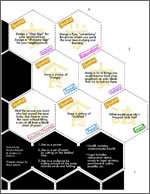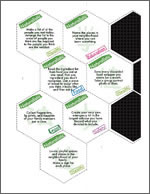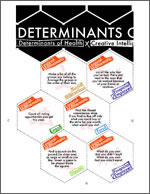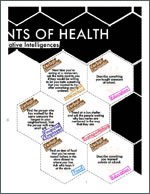Hiroko Kikuchi + Jeremy Liu
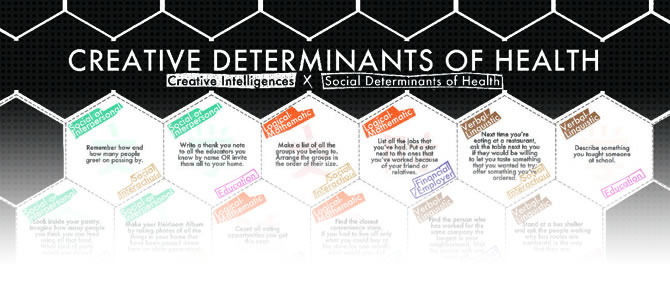
Creative Determinants of Health
The Creative Determinants of Health Cards are a game, a manual, a meditation and a muse for understanding the Social Determinants of Health. The Cards are a result of combining the concept of Creative Intelligences, the way in which people create an understanding of the world around them, with the Social Determinants of Health.
They are not all-encompassing, yet they are comprehensive in covering each of the Social Determinants and in applying each Creative Intelligence. This means there’s something for everyone in these cards, whether your learning style is mathematically oriented, relationship-oriented, or bodily oriented; and for whatever your starting interest may be — education, environment, housing, or transportation, there’s a Social Determinant topic for you. To find out more about these Social Determinants of Health, follow this link: http://bit.ly/CDHforAiC
Some of the cards will read as pretty straightforward, and others will not be as clear. This is okay; the cards’ instructions shouldn’t be all straightforward for anyone! Engaging your imagination in interpreting the meaning of each card is part of the fun! While not all the cards might apply to your neighborhood or community, even that itself is an observation! If a card’s instruction doesn’t make sense or apply to your neighborhood or community, make a note of why and then adapt it or change it.
These cards are observation tools for a practice of Social Determinants of Health because they build on you, yourself, as the most powerful instrument of monitoring, measuring and researching your environment and surroundings and circumstances. These card instructions are meant to engage you in the joy of research.
For more information, or to send us documentation of your use of the cards, contact us at creativedeterminants@artistsincontext.org
Artists’ Statement
When we first learned of the Social Determinants of Health from Harvard School of Public Health Professor Ichiro Kawachi, we were taken by how radical yet obvious a framework it presented for understanding how health happens. Health happens in a social context because humans are social beings. This social context has a greater effect on health outcomes than our genetics and our access to the health care system. We remain healthy because of our social context; we access the health care system typically when we are ill. Influencing our social nature is the next great opportunity for health care, and it begins with each of us.
In schools of public health around the world, social epidemiology researchers and academics are uncovering the linkages between social, cultural, physical and economic factors and the health of individuals, families and communities. We began to search out how we might tackle the translation of Social Epidemiology into practice; we came across the notion of “agency” as a key determinant of one’s health outcomes. Agency, or the feeling of control over the social, physical and economic aspects of one’s life, is a key determinant of health. We were struck by the possibility for agency through engagement of creative intelligences, creative ways of being. Hence, the Creative Determinants of Health.
We apply the practices of Happenings, Situationist Internationale and Fluxus instruction art to everyday life. We build upon the learnings of community development; participatory action research; Kogengaku (Modernologio); and Paulo Freire. We seek out the component experiences of life and build from them towards a new understanding of how life and art are intertwined.
Download the CDH User Manual
Click to download high-resolution PDF of poster (70 Mb) for large-format printers (capable of at least 18” x 24” printing).
For smaller, letter-sized printing, download 8 pieces of the poster, assemble and/or create cards, maybe put them in a box, according to the User Manual. (Click on the images below to download a PDF file.)
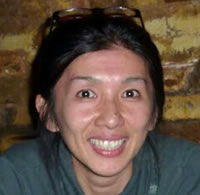 Hiroko Kikuchi combines community development strategies with conceptual and performance art methodologies to engage participants in a personal, reflective and prospective process. Her projects intervene in existing social structures and systems while creating a distinct pattern of social, cultural and economic experiences. Hiroko currently serves as the Director of Community Building for the Aichi Triennale. She also has been one of the founding design and implementation team members of WAWA PROJECT, A Social Creative Platform for Opportunity, A Tohoku Earthquake and Tsunami Recovery Project sponsored by the Japan Ministry of Economy, Trade and Industry; the Education & Outreach Coordinator at the List Visual Arts Center at the Massachusetts Institute of Technology; and the Teen Programs Manager at the Boston Museum of Fine Arts. As a consultant, she helped develop the Chinatown Cultural Development Strategy for the Washington, DC, Office of Planning and has led projects for the Boston Public Library Foundation and the Vietnamese American Civic Association, among others. She has served as an arts educator for numerous organizations; is adjunct faculty at Rikkyo University, Tokyo, Japan; and is a contributing writer to Public Art Magazine, Japan. She is a cofounder and Principal of Creative Ecology Partners, a hybrid art, design and community development studio and consulting firm providing expertise and innovation in community development, public participation and arts and cultural planning to nonprofits, foundations, municipal government and others.
Hiroko Kikuchi combines community development strategies with conceptual and performance art methodologies to engage participants in a personal, reflective and prospective process. Her projects intervene in existing social structures and systems while creating a distinct pattern of social, cultural and economic experiences. Hiroko currently serves as the Director of Community Building for the Aichi Triennale. She also has been one of the founding design and implementation team members of WAWA PROJECT, A Social Creative Platform for Opportunity, A Tohoku Earthquake and Tsunami Recovery Project sponsored by the Japan Ministry of Economy, Trade and Industry; the Education & Outreach Coordinator at the List Visual Arts Center at the Massachusetts Institute of Technology; and the Teen Programs Manager at the Boston Museum of Fine Arts. As a consultant, she helped develop the Chinatown Cultural Development Strategy for the Washington, DC, Office of Planning and has led projects for the Boston Public Library Foundation and the Vietnamese American Civic Association, among others. She has served as an arts educator for numerous organizations; is adjunct faculty at Rikkyo University, Tokyo, Japan; and is a contributing writer to Public Art Magazine, Japan. She is a cofounder and Principal of Creative Ecology Partners, a hybrid art, design and community development studio and consulting firm providing expertise and innovation in community development, public participation and arts and cultural planning to nonprofits, foundations, municipal government and others.
Through her solo work, Kikuchi builds on the legacy of Fluxus-inspired instruction work and performance art, addressing themes of cultural and social identity. Her recent solo performances have been included in festivals and shows such as Open Art International Performance Festival (Beijing, China); Intervene! Interrupt! Rethinking Art as Social Practice (University of California, Santa Cruz); Deformes – Primera Bienal Internacional de Performance (Santiago, Chile, 2007); Contaminate (Boston, USA); Corporal Heat: International Performance Festival (Boston, USA); Castle of Imagination (Poland); Tremor (Bogotá, Colombia); among others. Collaborative projects include: creating Chinatown™, a site specific installation in Philadelphia’s Chinatown using Glidden’s stock paint color “Chinatown Orange” as a way to interrogate its naming history; cofounding The National Bitter Melon Council, an extensive project originating in the South End neighborhood in Boston that utilizes its namesake vegetable to investigate the concept of bitterness in all its forms and cultural permutations that received the Artadia Award; and designing and leading Observatory: Oakland, an experimental observation project designed to reveal the ephemeral or overlooked, and yet essential, qualities of neighborhoods throughout Oakland, CA.
More information about Kikuchi can be found at: www.linkedin.com/in/hirokokikuchi and www.creativeecology.net
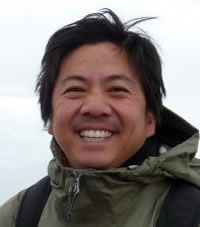 Jeremy Liu is a community builder/organizer, urban planner, real estate developer, artist and technology designer with a passion for civic, social, cultural and political entrepreneurship. He is currently Principal of Creative Ecology Partners and previously served as the executive director of two nationally recognized community development corporations. He is also a cofounder of The National Bitter Melon Council.
Jeremy Liu is a community builder/organizer, urban planner, real estate developer, artist and technology designer with a passion for civic, social, cultural and political entrepreneurship. He is currently Principal of Creative Ecology Partners and previously served as the executive director of two nationally recognized community development corporations. He is also a cofounder of The National Bitter Melon Council.
He has worked for and with communities to collectively and creatively confront issues of social and environmental equity, sustainable development, affordable housing and community empowerment. In community development, he implemented the formal adoption of the Social Determinants of Health as a strategic policy framework, becoming the first community development corporation in the country to aggressively pursue this transformative path for a 40-year-old field. He has overseen multiple business lines, 110 staff and a budget of $10 million in annual revenue and more than $150 million in assets. He also designed and raised initial capital for the first real estate investment fund to be screened for positive social determinants of health impacts. He created a lightweight, open-source tool for a distributed, crowd-sourced language interpreter services platform with the MIT Media Lab, and was part of the Knight Foundation-funded Center for Civic Media at MIT. Jeremy is one of the original designers of Participatory Chinatown, an online-offline hybrid game for community planning in Boston’s Chinatown that was awarded a MacArthur Foundation Digital Media and Learning Competition grant. Most recently, he succeeded in shifting the overarching organizational strategy of a 36-year-old community development corporation to a social epidemiology framework.
Liu has written and lectured in the US and abroad about participatory planning, technology and the community development role for arts and culture, and he regularly writes for Rooflines, the housing and community development blog for Shelterforce Magazine, a publication of the National Housing Institute. He has served on review panels for the National Endowment for the Arts, the National Endowment for the Humanities, the National Science Foundation, the New England Foundation for the Arts, the San Francisco Arts Commission and ArtPlace. He has received an Artadia Artist Prize, a Visible Republic Artist Grant, LEF Foundation Contemporary Work Fund and Creative Work Fund grants. He has also led participatory arts- and technology-based community development projects in the US and Asia. His collaborative projects include: Chinatown™, The National Bitter Melon Council and Observatory: Oakland.
He chaired the successful campaigns of Sam Yoon, the first Asian American to run for and win elected office in the City of Boston in 2005 and 2007; he also chaired the groundbreaking Yoon campaign for mayor in 2008. He is a 2009-2012 Barr Foundation Fellow; he currently serves on the boards of IGO Car Sharing, The Center for Neighborhood Technology, The Interaction Institute for Social Change and The New England Foundation for the Arts.
More about Jeremy can be found at: www.linkedin.com/in/jeremycliu/ and www.creativeecology.net

